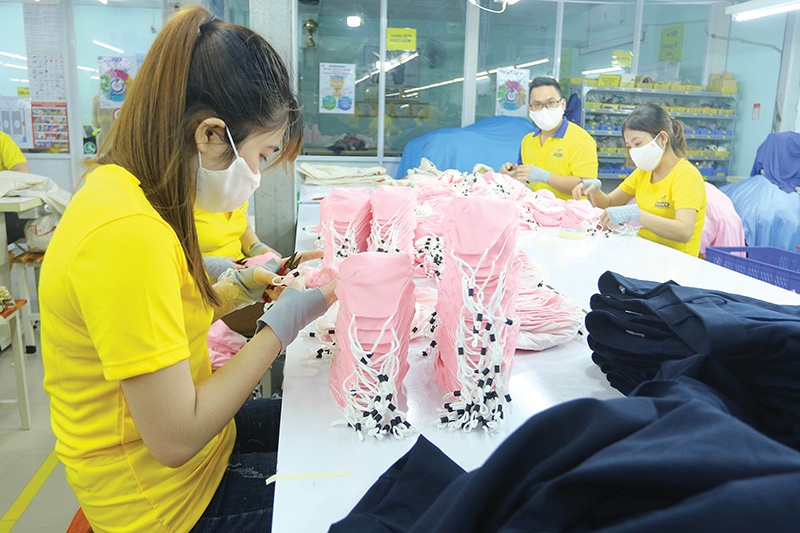Level-up can protect workers
 |
| Upskilling and reskilling could be key solutions to solving the labour shortages, Photo: Le Toan |
With thousands of workers previously based in major cities deciding to move back to their hometowns due to unbearable pressures through the summer’s pandemic restrictions, a wide array of companies in textiles, footwear, electronics, and more are suffering from massive gaps in labour and accompanying skills.
According to Vu Duc Giang, chairman of the Vietnam Textile and Apparel Association, related enterprises are also encountering the double issue of labour shortages of unskilled workers as the peak production period for Lunar New Year approaches.
“Lack of human resources is an existing problem for textile enterprises, especially in Ho Chi Minh City and the southern provinces,” Giang said. “This is a huge challenge for them because we do not have an optimal plan to recruit workers in these new conditions. I think the labour deficit from now to the end of the year could be more than 35 per cent.”
To cope with such setbacks, many businesses are attempting to invest in technology innovation while upping demand for skilled workers.
Electronic component manufacturer Cu Tech Vietnam Co., Ltd. has begun to use machines to replace workers in processing surface parts and checking for defective products over the past few months.
Previously, businesses such as Cu Tech needed up to 100 workers for this stage but after the introduction of these new measures, the rate of defective products has decreased significantly, while saving up to 33 per cent of human resources.
Mai Van Dong, chairman of Cu Tech’s Trade Union said, “The surface parts processing department has the hardest job in the company, so the rate of workers leaving is high. The application of machinery not only helps Cu Tech solve difficulties in recruiting workers, but also improves working conditions so that they can feel secure in production.”
A report on COVID-19 impacts on Vietnamese businesses by the Vietnam Chamber of Commerce and Industry shows that one-third of processing and manufacturing enterprises plan to increase the number of high-quality jobs in the near future.
Such businesses are also increasingly focusing on upskilling workers or implementing more electronic devices into their role, contributing to increasing productivity and helping them adapt to new technologies.
McKinsey’s latest research on the future for consumers, workers, and companies in the post-pandemic recovery, published in May, found that COVID-19 has forced more activities and functions to move online, fuelling a mass digital migration. The report also shows that businesses are turning to more digital tools to ensure the requirements of less contact with customers.
For example, organising virtual meetings or seminars is becoming a trend applied by most businesses, while more are turning to automation and AI to cope with surges in demand and the need to reduce workplace density. Technicians can solve problems at factories thousands of kilometres away through VR, and changes like these not only deliver more convenience but also contribute to creating greater efficiency.
Leaders admit that this transformation is time-consuming and expensive, with some manufacturing enterprises still trying to maintain operations with a small number of employees and switching entire stages to working online.
Pham Van Tam, chairman of electronics company Asanzo Group JSC, said it has only maintained 10 per cent of its operations after four months of implementing the stay-at-work model. With some units required to work at the factory, Asanzo encouraged employees near the factory to join the model. “Currently, each department is building management software and employees must report the work performed on this software. Through these reports, department heads will update the progress and work of each employee,” Tam said.
A representative of e-payment group Payoo also shared that many employees have started taking advantage of online courses organised by the company during social distancing to improve their knowledge and expertise. “For example, a Japanese language class taught by Payoo’s Japanese staff has attracted a lot of participants,” the representative said.
Many businesses have now partnered with training and vocational institutions to build their own training programmes. According to Do Ngoc Hoang, director of FPT Software Academy, enterprises must organise retraining of many skills so that new workers can meet job requirements.
“Every year the academy trains 3,000-4,000 new trainees who can meet the needs of working on projects, but the training time for some skills sometimes takes many months,” he said.
What the stars mean:
★ Poor ★ ★ Promising ★★★ Good ★★★★ Very good ★★★★★ Exceptional
Related Contents
Latest News
More News
- Foreign leaders extend congratulations to Party General Secretary To Lam (January 25, 2026 | 10:01)
- 14th National Party Congress wraps up with success (January 25, 2026 | 09:49)
- Congratulations from VFF Central Committee's int’l partners to 14th National Party Congress (January 25, 2026 | 09:46)
- 14th Party Central Committee unanimously elects To Lam as General Secretary (January 23, 2026 | 16:22)
- Worldwide congratulations underscore confidence in Vietnam’s 14th Party Congress (January 23, 2026 | 09:02)
- Political parties, organisations, int’l friends send congratulations to 14th National Party Congress (January 22, 2026 | 09:33)
- Press release on second working day of 14th National Party Congress (January 22, 2026 | 09:19)
- 14th National Party Congress: Japanese media highlight Vietnam’s growth targets (January 21, 2026 | 09:46)
- 14th National Party Congress: Driving force for Vietnam to continue renewal, innovation, breakthroughs (January 21, 2026 | 09:42)
- Vietnam remains spiritual support for progressive forces: Colombian party leader (January 21, 2026 | 08:00)

 Tag:
Tag:




















 Mobile Version
Mobile Version